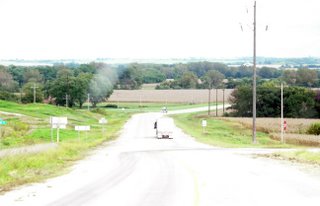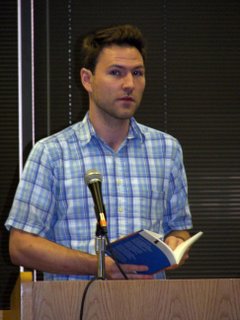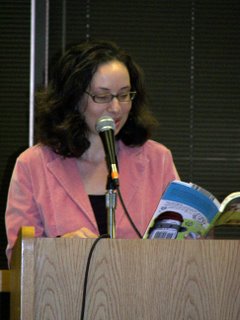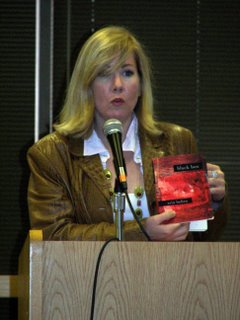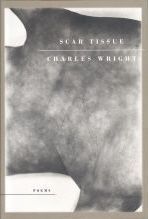
This time it’s personal!
OK, so just posting that email wasn't enough, so here goes, reading along through it the second time, this is my response to the version of this essay distributed by AWP. If you're interested in reading John Barr's complete essay, go to http://www.poetrymagazine.org/.
“The following excerpt is from the September, 2006 issue of POETRY, 'American Poetry in the New Century,' by John Barr, President of the Poetry Foundation and investment banker for SG Barr Devlin:”
Already I’m thinking “oh how I can’t wait to read this insightful, thoughtful, subtle essay written by someone who has a true appreciation for art. If only Dana Gioia had a hand in it, and perhaps if it would hold up Mark Twain as a model for contemporary poets, then I really could consider it relevant and even-handed.”
So Barr begins by, pardon me, lowering the bar:
''More than a decade ago, Dana Gioia recognized poetry's disjunction from public life, in his seminal essay, ‘Can Poetry Matter?’ The question still pertains.”
Now that seminal Dana Gioia has been invoked, and the muse is present, seminally, we can begin. Apparently. And seminally.
“Lacking a general audience, poets still write for one another. (Witness the growth of writing workshops and the MFA program.) Because the book-buying public does not buy their work, at least not in commercial quantities, they cannot support themselves as writers. So they teach. But an academic life removes them yet further from a general audience.”
Here’s where I start calling John Barr an elitist snob. Mr. Barr, I hereby challenge you to name three people in the “general audience.” Look out your window. I know they’re small down there somewhere in the mists of Chicago . . . but I’m sure you stood next to one once while getting gas? It is hard for me not to allow myself to sink further into sarcasm, but I’ve absolutely HAD it with this kind of “Ivory Tower” argument. What kind of teaching does he think “MFA program” poets end up performing? And where are these jobs? The average MFA poet ends up teaching a 4/4 load, at least half in general education, at a regional university for something around 42,000 a year. Living, working, and being a part of, the general population. Going to general audience movie theaters and general audience restaurants. I propose, therefore, that John Barr is further removed from the general audience than most poets. Or at least his suit is.
He goes on:
“Each year, MFA programs graduate thousand of students who have been trained to think of poetry as a career, and to think poetry has something to do with credentials. The effect of these programs on the artform is to increase the abundance of poetry, but to limit its variety. The result is a poetry that is neither robust, resonant, nor---and I stress this quality---entertaining; a poetry that both starves and flourishes on academic subsides.”
So here he is. First off, how divorced from reality must he be to say that there is a limited variety of poetry out there? Obviously, all he does is read “Poetry” (the magazine, that is). If all I read were “Poetry,” I, too, would think the poetry written these days limited, and neither robust nor resonant. And then he really gets to his major concern: Poetry is not entertaining enough. OK, so Mr. Barr, after his long day of Poetry Foundationing and Investment Banking, wants to find some entertaining poetry to sooth him into his evening slumber. And get him all ready for another go-round tomorrow!
The problem here is that MFA poets have much less of a problem than does Mr. Barr’s imaginary general audience. Poetry can’t compete with TV, I’m sorry. Or actually, I’m not sorry. Why someone would want poets to be entertaining is beyond me. Art should be entertaining? Where does it say that in the historical record? Last I recall, poets are supposed to be thrown out of the city. So, poetry needs to be more decorative. Which of course makes sense, coming from someone whose deepest reading on art is “Can Poetry Matter?” I’ve been irritated (is this coming across yet) by that silly essay for years. Dana Gioia’s best argument (ok, I’m going from memory here) for increasing the enjoyability of poetry as performance is to have less poetry and more performance. Music or something. Maybe wear a Robert Pinsky Halloween mask. My biggest complaint about Dana Gioia’s argument is his complete inability to take his own advice.
How popular must poetry get before John Barr gets happy? Should Dan Brown write some verse? I'm sure he could. He has a computer and apparently is great at google searches.
And the pot shot that Barr takes at ‘academic subsidies.” John Barr thinks that poets are sponging off of the academy. As opposed to, say, a $100 Million dollar subsidy from a very wealthy patron?
Back to Mr. Barr:
“Not surprisingly, poetry has a morale problem. A few years ago I read a review, in the Sunday Times, of three books of poetry.”
OK, another problem. If all he knows of poetry is “Poetry” and the “Sunday Review” from a few years ago, he’s certain to say what he’s going to say next:
“One was about the agonies of old age, one about bombed-out Ireland, one about the poet's dead father. The question arises: how does one rouse an entire art form out of a bad mood?”
Two things: If he’s only reading three REVIEWS (from a few years ago), how is he to know what’s really in those books (or any actual books - I mean, if this is the best example he can come up with, why are we listening to this guy? Oh yes, the $100 Million...)? Granted, these three books don’t sound very interesting to me either, but rather than read a review of three high profile “experience” books, I think I’ll actually go out and read three real books.
The last book of poetry I read is Annus Mirabilis, by Sally Ball. I can’t get pithy with a one sentence synopsis of its content, because it’s an interesting, thoughtful mix of poems roughly circling the lives and theories of Newton and Leibniz, filtered through a lyrical, experiencing contemporary voice. It's NOT a downer, by the way. Currently, I'm re-reading the books of Robert Hass and Brenda Hillman. More about that some other day.
Oh yes, Mr. Barr is still hammering away at it:
“Of course the tragic has a place in poetry. Indeed one of poetry's jobs is to descant on the worst that life can hand us. As Yeats said, let 'soul clap its hands and sing, and louder sing / For every tatter in its mortal dress.' But art should not be only about malfunction. Poetry need not come only from impairment. To the extent it does, it makes for a poetry that is monotonic---mono-moodic, if you will. . . .”
I’m not sure what he’s getting at here. Are we all too much like Yeats? Do we just need a happy pill? Surely THAT can’t be his real argument. We aren’t happy enough? What does he want now, stand up comedy? So, two poets walk into a bar?
So, two poets walk into a bar.
The third one ducks.
“Poetry's limitations today come not from failures of craft (the MFA programs attend to that) but from afflictions of spirit. American poetry has yet to produce its Mark Twain.”
So now we have it. Mark Twain. So Mark Twain is funny? Upbeat? Someone should clean this guy’s glasses and send him back to those books. But even so, taking his argument in the spirit it was given . . . “Be more pleasant and don’t go one so about things falling apart” . . . I submit that if Billy Collins can’t connect to a large general audience, then I shudder to think of what the poet Mr. Barr is imagining would look and sound like. Aren’t Billy Collins and Robert Pinsky and Dana Gioia precisely what Dana Gioia and John Barr are calling for? People tell me Billy Collins is funny, right? Or Robert Pinsky? (PS. Do MFA programs really attend to craft? When is the last time John Barr sat in on an MFA program? Where is his information coming from?)
''The combined effects of public neglect and careerism, then, are intellectual and spiritual stagnation in the art form.”
And where does this come from? In what way was this point argued or proven? As if Robert Frost wasn't careerist? or should we be going back further? Wordsworth? Pope? Where is the golden age Barr is wanting to resurrect?
“Although poets pride themselves on their independence, when did you last read a poem whose political vision truly surprised or challenged you? Attitude has replaced intellect.”
OK, now he’s completely shifted gears. Perhaps he’s realized that his little rant was silly, and he’s trying to re-direct. I hear that investment bankers are good at such things. I challenge John Barr to read Amiri Baraka, if he wants surprising and challenging political poems, if challenging and surprising is really what he wants. Or he could google search “poets against the war.” But maybe those are all attitude poems. Perhaps we need more intellect. But isn’t that what Robert Pinsky and Dana Gioia and Billy Collins and Ted Kooser are for? Aren’t they the burning intellects of contemporary letters? They’re the ones I keep seeing on TV. They must be, right? Is John Barr calling them out as well?
As AWP writes in response:
“Clearly, Mr. Barr needs some cheering up. Send your favorite, humorous contemporary poem to:
The President
Poetry Foundation
444 North Michigan Ave., Suite 1850
Chicago, IL 60611”
Yes, clearly John Barr needs to get out more. But with $100 Million in his pocket, if John Barr can’t find good poetry in America, it surely must not exist. It’s amazing and wonderful to think that someone would give such a huge sum to a literary journal / foundation. It’s tragic that the organization is this short-sighted, insular, stuffy, reactionary, and all around annoying one headed by John Barr. I don’t hate John Barr (love the sinner, hate the sin, as they say), I just think he has no idea what he’s talking about.
I’ll give the last word to a poet. Here’s Brenda Hillman, from Cascadia:
Weather taught
you to write funny. When it stops
being wrecked, we’ll write normally.
Put that in your pipe, Mr. Barr, and smoke it.






